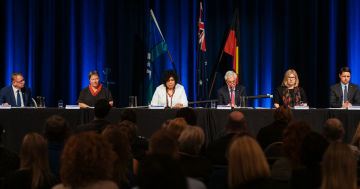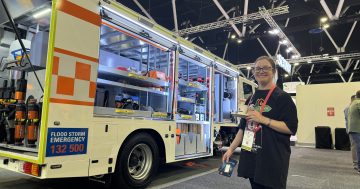
CEO of Carers ACT Lisa Kelly says carers of people with a disability felt invisible and fell through the gaps during the pandemic. Photo: Carers ACT.
A lack of support for disability carers including inadequate access to personal protective equipment (PPE), a scarcity of targeted information and a paucity of education and acknowledgment of children with disabilities resulted in carers falling through the cracks during the pandemic, an ACT Committee heard.
Carers of someone with a disability felt “invisible” during the pandemic, CEO of Carers ACT Lisa Kelly said during her scathing testimony to a tri-partisan parliamentary committee set up to analyse the ACT’s pandemic response.
“Carers provided the brunt of the work to keep people safe and COVID-free at great personal health, wellbeing and financial cost and this has not been publicly acknowledged or thanked,” Ms Kelly said.
“There was a disparity in response between the aged care sector and the disability sector. There were significant gaps in the understanding of the risks and needs of people with a disability and the pandemic highlighting the gaps between the interface of health and disability.
“In many ways, they have helped flatten the curve, but at what cost?”
During the height of the pandemic in the ACT, households were still able to receive a limited number of visitors; however, many of the Territory’s 50,000 carers did not want to entertain the risk with a lack of PPE available to them.
“What do you do?” Ms Kelly asked.
“Do you let the support worker in and meet the hygiene and daily needs of the person you care for but risk exposure? Or do you not let the person in and do all those things yourself?”
This isolation led to carers not being able to see their families for more than three months out of fear of spreading the virus to the vulnerable people they were caring for, Ms Kelly said.
The Government was also chastised for still not having a plan if a carer were to become infected with COVID-19.
Carers ACT provides a Flexible Respite program which is funded through the federal Department of Health and provides a support worker to accompany the person being cared for on a medical appointment or social outing, to assist in tasks around the house like cleaning or gardening, or to stay with the person so the carer can attend an appointment.
But carers are still finding themselves susceptible to burnout and fatigue.
“The carer does not have any resources to actually engage in anything that reinvigorates the soul and the spirit,” Ms Kelly said. “[It is] not just about providing care for the person [they] care for.
“We are calling for some support funding for the next 12 to 18 months where carers can come and ask and receive money to get a facial, spend the day in a day spa, go to a movie … do things that are about rebuilding [their] spirit and rebalancing my wellbeing.”
This built into Ms Kelly’s broader call for practical support for carers in the ACT, after a misdirected focus on practical support during the pandemic when carers could not access the help because of how closely they worked with vulnerable people.





















